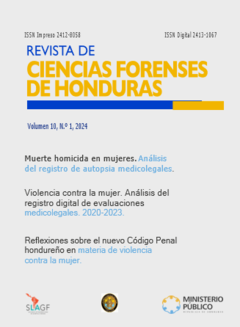Violence against women. Analysis of the digital record of medicolegal evaluations. 2020-2023
DOI:
https://doi.org/10.5377/rcfh.v10i1.18480Keywords:
Violence Against Women, Gender-based violence, Forensic medicine, Socioeconomic factorsAbstract
Justification: In Honduras, violence against women requires more research, it is estimated that 50% of women aged 15 or more have experienced it at some point in their lives, being the Latin American country with the highest rate of femicides.
Objetive: To analyze the contexts in which Honduran women who file a complaint are most frequently assaulted and then evaluated in medico-legal services.
Methodology: Cross-sectional, descriptive study. The digital database of records of medico-legal evaluations carried out between 2020 and 2023 in Tegucigalpa and San Pedro Sula was analyzed; 14,700 records met the selection criteria: Female sex, 11 or more years of age, evaluated for injuries or sexual crime. The data was compiled in an Excel® spreadsheet and analyzed with the PSPP® statistical program, using descriptive statistics parameters.
Result: The women evaluated had a low level of education, 81% did not complete secondary education and 3% had no education at all, occupations were diverse, the most frequent being housewife (33%), students (15.55%) and merchants (9.73%), 3% had no occupation. 43% were in a common-law marriage, 39.74% were single, 10% were between 11 and 14 years old. 43% of the victims of violence were assaulted by their partner or ex-partner.
Conclusion: The analysis reflects the multiple dimensions that converge in the victims of violence who are attended to in the forensic services of our country, at a personal level, with limited self-development conditions (illiteracy or low education, without economic independence, without employment or underemployed), violence against women begins at home and is perpetrated in the first instance by their family members, perpetuating patterns of violence that are socially accepted by the prevailing macho culture; it continues in their immediate environment (community), and reaches its maximum expression in couple relationships. The enormous social inequality experienced by the country in general, but which particularly affects women, contributes to the perpetuation of the problem.
Downloads
172
HTML (Español (España)) 11
Published
How to Cite
Issue
Section
License
Copyright (c) 2024 Belinda Bárbara Castillo, Mireya Matamoros, Álvaro Solórzano Canales

This work is licensed under a Creative Commons Attribution-NonCommercial 4.0 International License.
El autor conserva los derechos de autor bajo los terminos de una licencia CC NC 4.0





